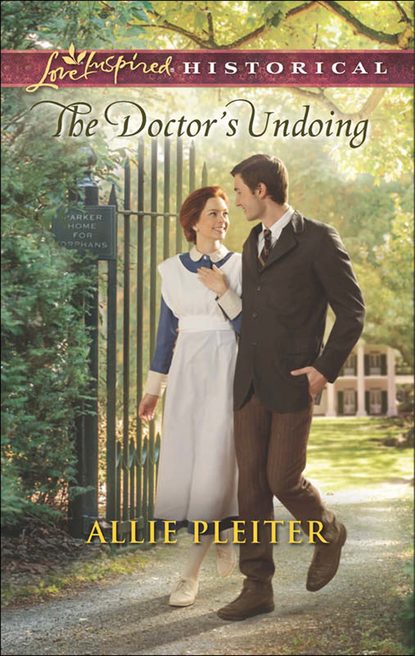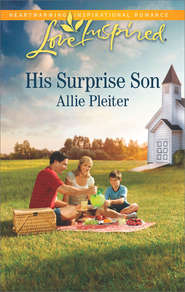По всем вопросам обращайтесь на: info@litportal.ru
(©) 2003-2024.
✖
The Doctor's Undoing
Настройки чтения
Размер шрифта
Высота строк
Поля
Miss Landway stared after her, laughing. “Oh, she’s delightful.” She turned to look at Daniel. “Are they all like that?”
Daniel tucked his astonishment back down inside as he motioned her to take a seat at the chair in front of his desk. “Like what, exactly?”
She cocked her head so far to one side that a curl bobbed over her raised brows. “Such contradictions—pale, sullen, then suddenly friendly. I was worried they’d all be grim, given the troubles they’ve had.”
“They’re children, Miss Landway, not soldiers. Many of them are sullen, as you put it. Withdrawn. Others are cheerful, despite coming from some dreadful situations. Many of them haven’t had a dependable home or meal until they came here.”
“That’s just wrong, if you don’t mind my saying so.” He’d forgotten a grown woman could pout as easily as any youngster. “Children shouldn’t know so much sadness. Children ought to have mamas and papas, don’t you think?”
A wiggling tendril of doubt over this recent hiring grew stronger in Daniel’s chest. He steepled his hands. “Children ought to have a lot of things the war took from them. Surely your work at Camp Jackson gave you some preparation for situations like theirs.”
She looked out the door that Gwendolyn—he used the name in his head now that she’d permitted it—had exited. “I’m no stranger to a sorry tale, Dr. Parker. I’ve seen some sad, lost souls come back from the war inside bodies that barely held their skin on.” She returned her gaze to Daniel, pointedly meeting his eyes. “Only it seems a double sorrow to bear so much at a young age.” Miss Landway made a dramatic gesture of clasping her hands and planting them in her lap. Miss Landway was fond of dramatic gestures, it seemed. “I want to help.”
Daniel couldn’t decide if her enthusiasm stood any chance of holding. There were days when the demands of the Home nearly drowned his spirits. So much was out of reach for these youngsters. Starting life with so many strikes against them sometimes loomed like the largest of hurdles; a burden that pressed against his ribs so hard some nights, he had trouble catching his breath. “Excellent.” The last two nurses had left after a handful of weeks, and Daniel needed this one to stay.
Donna Forley, one of the oldest girls in the Home who often helped out around the office, poked her head into the door. “You asked for me, Dr. Parker?”
“Miss Forley, I’d like you to meet Nurse Landway. Can you show her to her rooms?”
Miss Landway stopped midhandshake to blink at Daniel. “Rooms?”
“You were expecting an army pup tent?” Daniel could not remember the last time he’d cracked anything close to a joke. Why had he chosen such an inappropriate time to start?
“Well, I’m just astonished, that’s all. It’s been a long time since I’ve had rooms. As in plural—to mind my grammar. The army’s not known for generosity in lodgings, you understand.”
Daniel tucked his hands in his vest pockets. “You have a suite of three rooms on the first floor of the girls’ dormitory.”
Her hand swept grandly to her chest, and the wiggling in Daniel’s own chest returned. “Three!” she pronounced. “A veritable embarrassment of riches. I’ll get lost.”
Donna launched a wave of teenage giggles at the jest. Giggling. Was he to be surrounded by giggling from here on in? “I highly doubt that. They are small rooms, I assure you. But I can promise you the luxury of a private bath.”
“A private bath. I swoon at the very thought.” She struck a pose that sent Donna into another round of tittering.
Daniel swallowed his sigh. “All the same, dinner is at five thirty in the dining hall. You can meet the rest of the children then, although I suspect Miss Martin will have told half of them about you already.”
“Gitch has a big mouth,” Donna confided.
“Well then, she’s my kind of gal. I like conversation, and lots of it.”
Daniel took a breath to ask Donna to help with Miss Landway’s cases, but the nurse had already plucked the pair of them off the floor. She squared her shoulders at the teen before he could get a word out and commanded, “Lead on, my dear Miss Forley.” The pair of them marched from the room, bright as sunshine and chattering already.
However had the army managed the likes of Ida Lee Landway? More to the point, how would he?
Chapter Two (#ulink_6ab98b2d-7e3d-5fc5-846b-11f50b3ffcba)
Ida took a small bit of time to explore the Home as she made her way to the dining hall for her first dinner. Her few visits to Charleston had shown her that the Home’s buildings were ordinary by the city’s standards: three stories high with a few of the requisite columns and shutters framing the windows. Still, the compound held none of the ornamental grace for which Charleston’s buildings and residences were famous.
The front entrance led into the center wing of the U-shaped main building. This segment housed a half-dozen classrooms on the upper floors, while what few offices there were shared the main floor with the dining hall. On one end of the main wing sat Dr. Parker’s office and a small receiving parlor. Ida presumed his living quarters sat beyond the French doors at the far end of that parlor, but didn’t dare investigate. On the other end of the wing sat a library and a common study room. Her infirmary was just around the corner from the library, at the beginning of the girls’ residential wing. The boys’ wing sat sensibly on the other side of the main building.
It was the thing that struck her most: the sheer sensibility of the place. The overwhelming practical, even institutional feeling of the whole structure. It felt off, wrong somehow. Too sensible. For someone coming from an atmosphere of the highly practical US Army, well, that was saying something.
She ventured out to explore the courtyard formed by the U of the buildings. A tidy, functional little play yard sat with swings, a teeter-totter, groups of benches and other diversions shaded by a large tree. True to Gitch’s word, there were also small plots that looked as if they had once been flower beds. She’d enjoy having flowers to look at again if the gardens could be coaxed back into life—sandy, scraggly Camp Jackson wasn’t ever known for its pleasant landscaping.
Knowing all the children were gathering for supper, Ida crossed the courtyard into the boys’ wing, which was a predictable mirror of the girls’ wing. She found an outward-facing window, and peering through it, found the side gate she should have used this morning. To her left, at the boys’ end of the common buildings, she saw what was likely the kitchen, for there were pots and shelving and washtubs outside as well as another neglected garden—this one looking more as if it had hosted vegetables rather than flowers. The clang of pots and pans and the smell of what might have been bread met her senses and reminded her she’d not had much of a lunch.
To her right was the back of the compound, where several outbuildings of various sizes stood. A garden shed, a storage shed and a third building Ida guessed to be the bathhouses. A friend had told her about the Home’s most unusual “luxury”: a set of small square bathing pools under gazebo-like roofs. Given that the children couldn’t easily be shipped off to the cooler beach or up into the dryer mountains, they seemed an unusual but practical way to battle the hot, humid days that made a low-country summer such torture.
Beyond all these lay the wrought iron fence that enclosed the entire Home. Simply put, Ida didn’t like it. Wrought iron fences could be beautiful—delicate, even—but this was hardly either of those things. It was a useful fence. Actually, if Ida were to put an adjective on the thing, she’d have chosen mean.
Not that the Parker Home for Orphans was an unpleasant place. Ida found she could be thankful for the small comforts and luxurious sense of space her quarters now had. Compared with the army, it was downright palatial. Three rooms, all to herself!
Still, the place wasn’t what she had been expecting. The feel of the whole compound simply stumped her, and she couldn’t work out why. All she could put a name to was a low, constant thrum in her stomach that it could be so much more.
A clue to her impression came to her as she came up on what had to be the dining room by sheer virtue of location, though definitely not by atmosphere. It was the quiet of the place that unnerved her.
Ida had found army mess halls to be loud affairs, and had expected dinner at the Home to be just as earsplitting, if not more. These were children, after all, and even her limited experience had taught her that young ones were noisy critters. Right now, the only thing that met her ears as she walked down the hallway toward the dining hall was an unnatural quiet. Children? Over fifty of them? This quiet? Ida had never known such a thing in all her days.
She turned the corner to view row upon row of noiseless children hunched over tin plates. A young boy gasped out a “Huh?” at her appearance, followed by a wave of swiveling heads. One would have thought these children had never seen a nurse before. Some of their mouths gaped, midchew, the youngsters astonished beyond whatever meager manners they possessed. Fond as she was of attention, Ida wasn’t accustomed to being such a cause of amazement. Whatever friendly greeting she’d rehearsed to give upon entering left her mind with the “whoosh” of pivoting heads.
“It’s her!” Gitch chirped, standing so quickly to shoot a waving hand in the air that it knocked a fork to the ground. The clatter rang like a fire bell in the quiet hall. Ida waved back, glad for a friendly face, only to watch an older child yank Gitch back down onto the bench and produce a “Shh!” nearly as blaring as the fork.
“Nurse Landway.” Dr. Parker’s voice came from where he’d obviously been waiting at the other end of the room, producing an equally massive wave of turning heads in his direction. Ida had the ludicrous thought that, were they to attempt a conversation like this, someone might end up seasick. “Children, please say hello to our new nurse.”
The “Hello” Ida received rang so hollow and obligatory that her insides echoed like an empty canyon. A gulp fought its way up her throat, and she stifled the urge to turn right around and repack her bags. It was the one voice, Gitch’s delightfully loud “Howdy!”—resulting in another yank back down onto the bench—that tugged Ida farther into the room instead.
They were like little soldiers. Sad, drab little soldiers lined up in unhappy rows too much like the rows of beds in Camp Jackson’s rehabilitation wards. Ida had expected sadness, had anticipated unhappy little frowns, but nothing on the order that faced her at this moment. She folded her hands in front of her, suddenly wishing she had a chair or railing beside her to clasp. “Hello, children.” She hated the lifelessness in her voice, but it was as if the room tamped down joy upon contact.
“Please come and join us in the staff dining room,” Dr. Parker said, motioning to the door behind him. They didn’t eat with the children? That made some sense if the children were noisy, but they clearly weren’t.
As she walked down the dining hall’s center aisle, Ida’s feet seemed to grow shoes of stone as every eye followed her. At Camp Jackson, such an entrance—a nearly bridal-aisle walk down the center of a room—would produce a flurry of whispered commentary. As a woman amid hundreds of lonely soldiers, Ida was no stranger to turning heads and loud, often ill-mannered commentary. Truth be told, she rather enjoyed such attention. It showed that the men were aware of and engaged in the world around them, a far preferable outcome to soldiers who closed themselves off after the horror of battle. Here, the quiet settled hard and hollow in Ida’s stomach.
Dr. Parker shut the French doors of the staff dining room behind him and pulled a chair out for her at a small oval table. Three other adults were already seated, but the two men rose at her entrance. “May I present Mr. Arthur MacNeil, who keeps things in running order around here.”
“It’s a pleasure to see a new face around here, lassie.” A red-haired man bulging out of his suspenders offered a friendly nod. His congenial features arranged themselves around a bushy ginger mustache. Narrow gray eyes framed in wrinkles gave him the look of an overworked but kindhearted soul. He looked to Ida like a man who would offer assistance in a tight spot but grumble about it endlessly afterward.
“Pleased to make your acquaintance, Mr. MacNeil.” Ida hoped her wide smile would gain her access to whatever gardening information the man had accumulated over the years.
“And this is Mrs. Jane Smiley, who serves as our girls’ schoolmistress.” Dr. Parker gestured toward a lady with a surprisingly angled face. How Mrs. Smiley, who had such a happy name and such a jolly plump build, managed to have such pinched, hard features was beyond Ida’s reckoning. She looked as though she ruled her classrooms with an iron fist.
“Good evening,” Mrs. Smiley said, allowing Ida to discover the woman’s voice was as sharp as her nose.
“Hello, Mrs. Smiley. How do you do?”
The woman offered no answer—and certainly no smile. Ida made an immediate mental note never to cross the fierce Mrs. Smiley.
“And finally, may I present Fritz Grimshaw, who serves as the boys’ schoolmaster.”
“Miss Landway, welcome to our facility.” Ida craned her head to meet an astoundingly tall man’s eyes. Long and thin, he resembled a tree with large, blinking eyes that peered over bottle-glass spectacles. She couldn’t hope to guess his age, for he seemed both young and old at the same time. While he didn’t seem to possess the authority Ida thought his position might require, she couldn’t help but wonder if Mr. Grimshaw’s sheer height allowed him to keep a large group of rambunctious boys in line. One could never hope to outrun legs so long.











